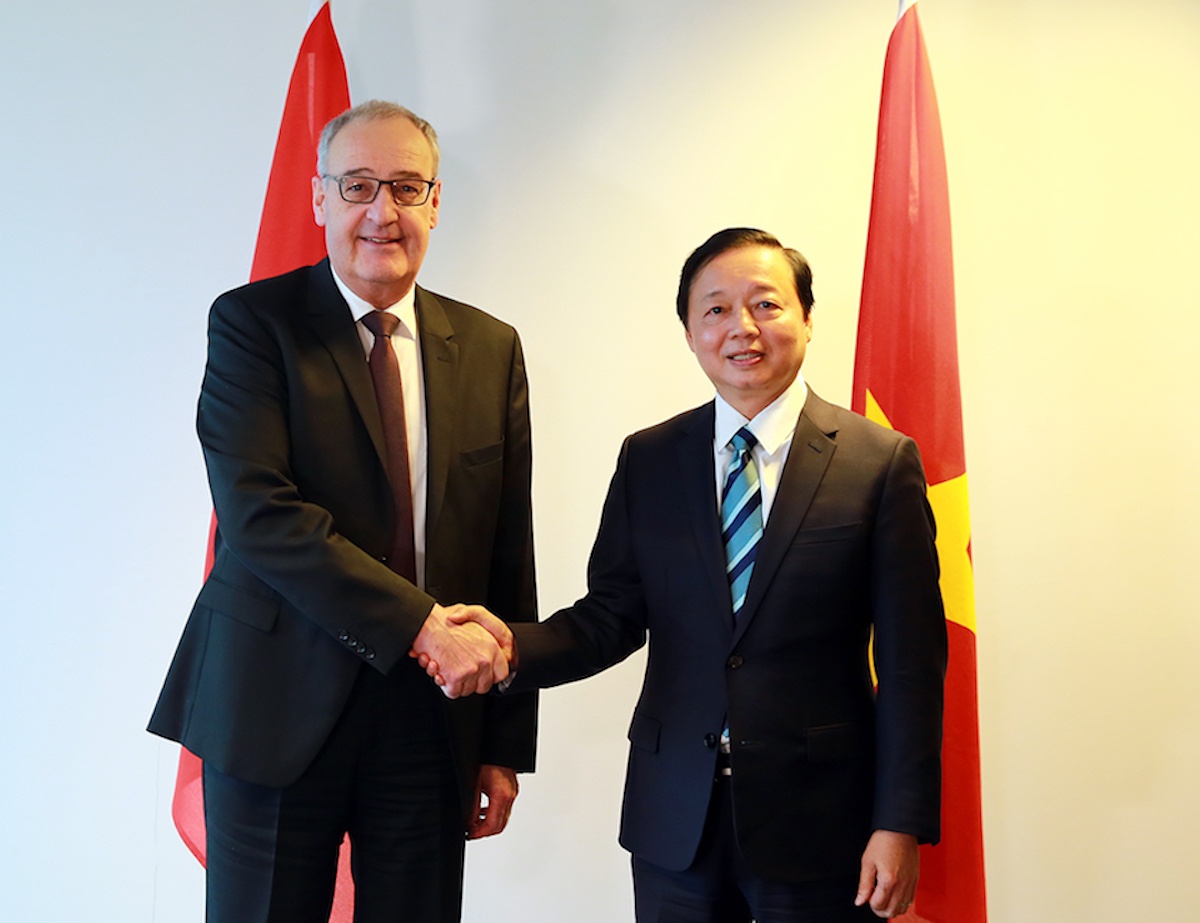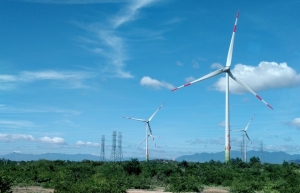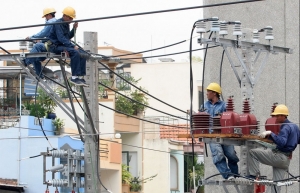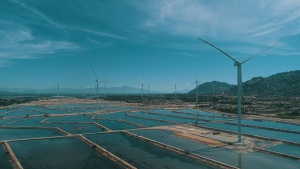Vietnam fosters shift to renewable energy
Switzerland will assist Vietnam's transition to a circular economy and digital transformation in line with sustainable trends, Guy Parmelin, said head of Switzerland's Department of Economic Affairs, Education, and Research, in talks with Tran Hong Ha, Vietnam's deputy prime minister, on January 16.
 |
| Vietnam's deputy prime minister Tran Hong Ha with Guy Parmelin, Switzerland's head of Department of Economic Affairs, Education, and Research |
The Swiss government is drafting a new energy plan until 2050, with an emphasis on renewable energy. Parmelin praised Vietnam's pledge to cut emissions at COP26 and congratulated Vietnam on signing a fair energy transition agreement with G7 nations and development partners.
In the meantime, the Vietnamese side seeks Switzerland's participation in more types of cooperation to aid Vietnam's transition from fossil to renewable energy sources. To attain its goal of zero emissions by 2050, Vietnam must collaborate in research and innovation.
Two weeks ago, Pham Nguyen Hung, deputy director of the Electric and Renewable Energy Authority under the Ministry of Industry and Trade (MoIT), said that the Vietnamese government had issued numerous policies and mechanisms to promote renewable energy sources.
Vietnam is the leader in the area in terms of renewable energy capacity growth. According to MoIT, the total installed capacity of renewable energy sources reached 20.7 GW in 2021, more than 27 per cent of the power system's total installed capacity.
In Vietnam, renewable energy has accounted for 27 per cent of the installed capacity of the overall power system during the last three years. According to Vietnam Electricity, this is a significant supplementary source of electricity supply, satisfying the present high load demand with an estimated 10 per cent annual growth rate.
According to Hung, the world's renewable energy technology is advancing swiftly, the cost of technology is decreasing rapidly, and technical solutions for electricity transmission and storage are making significant strides.
Hung said, "This is an excellent chance for the government to continue formulating policies and programmes to fulfil the objective of an energy transition toward green development."
The Ministry of Information and Technology is working to review and finalise the National Power Development Plan for the period 2021-30, with a vision to 2050 (PDP8), as well as to examine and propose legislation on renewable energy development to create a favourable legal corridor to encourage domestic and foreign private enterprise investors to invest in the construction of this energy source.
According to the PDP8 draft, renewable energy sources would steadily grow their proportion to about 24 per cent by 2030 and surpass 50 per cent by 2045. For instance, wind power's share of total installed capacity will rise from 10.8 per cent to 15.8 per cent by 2030, with offshore wind power alone accounting for 4.8 per cent.
The renewable energy market for the next phase is awaiting a new policy, PDP8, and the electricity purchase price policy for transition projects and new investment projects has not yet been announced.
Hong Kim Vi, Thailand's Super Energy Corp. deputy general director of global relations, divided energy investments in Vietnam into three categories: first is international investors. Second is Vietnamese companies gaining financing from both local and international institutions. Third is investors who want to engage in initiatives but have not yet secured funding.
The future development of renewable energy sources in Vietnam requires a "solid and long-term strategy," according to Vi. Vietnam lacks clear legislation regarding power selling prices, investor selection methods, and the foundation for executing renewable energy projects between now and 2025, and beyond.
 | SK E&S sets solid footprint in renewable energy SK E&S, South Korea's largest private renewable energy operator, signed an agreement to buy a 99.99 per cent stake in New Renewable Energy JSC No.1, which is a subsidiary of Gia Lai Power Electricity JSC to set a foot in the renewable energy sector in Vietnam. |
 | Responsive shift required in Vietnam’s energy policy Despite improvements in energy regulations, coal-generated electricity will persist for many years to come. Dr. Ngo Duc Lam, former deputy head at the Institute of Energy under the Ministry of Industry and Trade, explained to VIR’s Van Nguyen about the country’s established and ambitious objectives for renewable energy. |
 | ACEN continues to bolster renewable energy capacity in Vietnam Filipino power producer ACEN, Ayala group’s listed energy platform, continues to strengthen its renewable energy capacity in Vietnam after the company and BIM Group received financing worth $107 million. |
What the stars mean:
★ Poor ★ ★ Promising ★★★ Good ★★★★ Very good ★★★★★ Exceptional
Related Contents
Latest News
More News
- Bac Ai Pumped Storage Hydropower Plant to enter peak construction phase (January 27, 2026 | 08:00)
- ASEAN could scale up sustainable aviation fuel by 2050 (January 24, 2026 | 10:19)
- 64,000 hectares of sea allocated for offshore wind surveys (January 22, 2026 | 20:23)
- EVN secures financing for Quang Trach II LNG power plant (January 17, 2026 | 15:55)
- PC1 teams up with DENZAI on regional wind projects (January 16, 2026 | 21:18)
- Innovation and ESG practices drive green transition in the digital era (January 16, 2026 | 16:51)
- Bac Ai hydropower works stay on track despite holiday period (January 16, 2026 | 16:19)
- Fugro extends MoU with PTSC G&S to support offshore wind growth (January 14, 2026 | 15:59)
- Pacifico Energy starts commercial operations at Sunpro Wind Farm in Mekong Delta (January 12, 2026 | 14:01)
- Honda launches electric two-wheeler, expands charging infrastructure (January 12, 2026 | 14:00)

 Tag:
Tag:


















 Mobile Version
Mobile Version